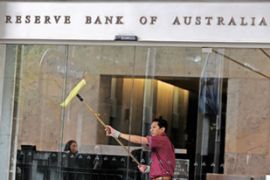Australia lifts interest rates, adding to mortgage pain
Reserve Bank of Australia lifts benchmark rate to 3.1 percent in effort to bring down high inflation.

Australia’s central bank has raised interest rates to a decade high, putting mortgage holders under greater strain as it seeks to bring down soaring prices.
The Reserve Bank of Australia (RBA) on Tuesday lifted the benchmark rate – which determines what commercial banks are charged for loans – by a quarter-percentage point to 3.1 percent.
Keep reading
list of 4 itemsWith inflation high, US consumer confidence down for second month
US consumers step up spending in October as inflation cooled
IMF head flags inflation, China slowdown as risks to Asia
Along with six previous hikes since May, the jump adds more than 1,000 Australian dollars ($672) to the monthly cost of an average mortgage.
The move follows a smaller than expected quarter-percentage point hike in October that diverged from the aggressive stance of counterparts such as the United States Federal Reserve.
RBA Governor Philip Lowe said inflation remained too high at 6.9 percent, far above the target of 2-3 percent.
“Global factors explain much of this high inflation, but strong domestic demand relative to the ability of the economy to meet that demand is also playing a role,” Lowe said in a statement.
Lowe said he expected inflation to rise to 8 percent during the final quarter before easing next year.
“The board expects to increase interest rates further over the period ahead, but it is not on a pre-set course,” he said. “It is closely monitoring the global economy, household spending and wage and price-setting behaviour.”
He added that the central bank remains “resolute in its determination to return inflation to target” and will do “what is necessary to achieve that”.
The RBA noted that the labour market remains tight, with unemployment at 3.4 percent in October — the lowest since 1974 — and many firms struggling to hire workers.
Still, there are signs the rate hikes are already cooling the economy.
Australia’s inflation slowed to 6.9 percent in October, while home prices fell for a seventh straight month in November, a drag on household wealth that could curb consumer confidence and consumption over the months ahead.